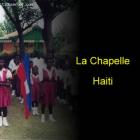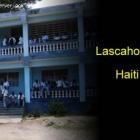ADVERTISEMENT
poverty
How a trip to Haiti can get you to Harvard University
Beside the many well-intentioned young children who usually take non profit mission trips to poor countries such as Haiti and others, some college-bound students are engaged in them just to increase their chances in getting into a good university. Frank Bruni who wrote the article: "To Get to Harvard, Go to Haiti?" calls it "drive-by charity work" in a the interest to impress admission staff.
He gave examples where some friends post on Snapchat and Instagram "typically showing one of them "with some poor brown child aged 2 to 6 on their knee" and explained "while many are well-intentioned, some seem not to notice poverty until an exotic trip comes with it."
Mouvman Peyizan 3e seksyon Kanperen received Equator Prize
South Haiti Environmental Peasant Movement awarded prestigious Equator Prize
The yam famers of South Department, Haiti, organized under Mouvman Peyizan 3e seksyon Kanperen (MP3K) initiative have been awarded the Equator Prize by the United Nations Development Program (UNDP). The prize was given to acknowledge yam farmers' notable work on developing sustainable farming techniques and increasing their incomes 400%. MP3K Coordinator Chavannes Casseus accepted the award, which represented the progress the peasants' movement has made towards protection of the environment, food sufficiency, and lessening the effects of climate change. The award was presented by Minister of Environment Jean-Marie Claude Germain and UNDP Representative Peter de Clercq.
White Rock Entrepreneurs Big Chance at $1,500 Award
The British Columbia (BC) Small Business Awards has nominated two White Rock small business owners for its top prize.
Laura Mawhinney is the owner of White Rock Thrift Shop, which donates all proceeds to Haiti Project Aftershock. She was inspired to begin the thrift shop, following her visit to shell-shocked Haiti in 2010. She is being recognized for her humanitarian work under the Best Community Impact category.
Mawhinney says she feels ". . . blessed and humbled to have been nominated" To her she's already won the brass ring when she hears her community say she has made such a difference in others' lives. What is adding to the excitement of Mawhinney's nomination is the recent news that her Project Aftershock lotion won for a second time Lush Cosmetics' Charity Pot grant of $8,000.
Episcopal Diocese of Long Island to help Agricultural College in Haiti
Using money garnered through the tithing of funds following the sale of the former church property in Brooklyn, the Bishop of the Long Island Episcopal Diocese, Rt. Rev. Lawrence C. Provenzano, has set aside $2 million for a grant to benefit ministry on a local and international level. One such beneficiary will be the St. Barnabas Agricultural College, located in the north of Haiti.
The bishop announced the grants in November at the diocesan convention held every year. The proceeds from the sale of the Church of the Redeemer are going towards ministries in Long Island, Queens and Brooklyn, as well as other non-American-based ministries. $300,000 each will be given towards recovery efforts from Ebola to dioceses in affected areas, to the Missionary District of the Navajoland, to the Cheyenne River Episcopal Mission, ministries in South Sudan, Ecuador, and Cape Coast, and also to Haiti. The donations were made for specific functions, and at the St. Barnabas College, the work to be done with their endowment will include the building of ministry space and housing facilities to give support to the work of the Bishop, Suffragan Oge Beauvoir, and the congregation of the diocese.
Former restavek Jean Robert Cadet fighting child slavery in Haiti
The hard lives lived by some of Haiti's children doesn't often make the news. Recently however, the stoplight has been shone on those working as little more than child slaves, and the man fighting to put an end to their plight is more than an authority; he is a survivor.
At only 4 years old, Jean Robert Cadet was given away by his family to another, following the death of his mother. This family is expected to take a child in, feed, clothe and school it in exchange for the child taking on housekeeping duties. This explanation however, simplifies and even sugar-coats it, as often the children become little more than slaves, doing all the work without reaping the benefits. The practice is so common in Haiti that there is a name for these types of children; restavek.
Rate of extreme poverty declining in Haiti
Long touted as the region's poorest country, Haiti has been riding a steady wave out of extreme poverty for the past few years and is now slowly seeing the fruits of the effort. The report from the World Bank shows that the country of 10 million people, while seeing its fortune change even on the heels of numerous, crippling natural disasters, still has more than half of its population too poor to meet the most basic need for food. A staggering 2.5 million of this number are even reported to be under the line of extreme poverty.
Haiti, not the poorest but the richest country in the Western Hemisphere
Used so often in news taglines and stories, the identity of Haiti as the Western Hemisphere's poorest country is probably engrained in most people's knowledge, however, Haiti as the richest country in the Western Hemisphere was once the truth universally known.
Its old moniker was "Pearl of the Antilles", a name it got because of the natural beauty found in its high, lush hills and its richness of resources and culture. The colonial era saw Haiti known as the wealthiest of all the British colonies in the Caribbean. It was influential too, playing a role in the Louisiana Purchase and helping to increase the wealth, reach and might of the United States on the back of the Haitian Revolution.
Visit of Michele Bachmann and Congressional Coalition on Adoption Institute to Haiti
The recent visit of Michelle Bachman, as a delegate of the Congressional Coalition on Adoption Institute (CCAI) delegation team to Haiti, under 20/20 program was an unforgettable heartbreaking inspiring experience. CCAI is a non-profit nonpartisan organization dedicated to raise awareness about the millions of homeless orphan children who are in need of permanent loving safe homes. CCAI works to eliminate the barriers that hinder them from realizing the basic right of a family.
Michelle Bachman, an advisory board member of CCAI and a Congresswoman from the great state of Minnesota has discussed about her recent trip to Haiti as "a glimpse into the worst parts of human injustice". Haiti, the poorest nation in the western hemisphere, has been struggling to recover itself from poverty, corruption and a devastating earthquake.
Devil is in the Details to Combat Food Insufficiency in Haiti
Haiti has a food insufficiency problem, and implementation of greenhouse farming techniques has worked to begin addressing it. Also known as vertical farming, greenhouses can produce up to three harvests annually. Haitian peasants, who use it, have increased their incomes ten times over traditional land farming.
Yet vertical farming alone is not solving the food insufficiency crisis. A paucity of joiners creates an obstacle to success. Crop producers distrust middlemen, whom they feel are buying at low prices from them and selling high, cheating them of a fair profit. Without adequate participants, food insufficiency in Haiti cannot be managed.
How Haiti Plans to eliminate extreme poverty by 2030
Since 2000, Haiti has gone through many disasters, both political and natural. However, despite this, Haiti has achieved some progress in controlling poverty.
Recent studies indicate that there is improvement in accessibility to basic services, and there is a decline in extreme poverty levels, that is, from 31% to 24%.
Achievements
• Improvements have been achieved in areas such as education, where the number of children enrolled in schools has risen from 78% to 90%.
• Progress has also been achieved in accessing sanitation, tap water, and electricity.
Challenges
Our objective is to share with you news and information about Haiti and the people of Haiti. Traditions, habits and the way we were or grew are alive in this site. We highly recommend that you Subscribe to our Newsletter and also share with us some of the things that are memorable and made us unique people.

 Haitians are a Proud People
Haitians are a Proud People  La Chapelle, Haiti
La Chapelle, Haiti  Lascahobas, Haiti
Lascahobas, Haiti  Life After Death
Life After Death  Verrettes, Haiti
Verrettes, Haiti